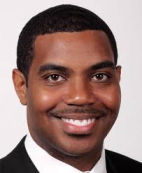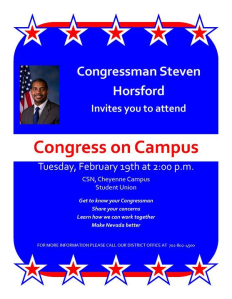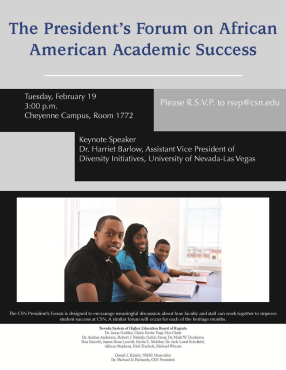By Chris Moxon
United States Congressman Steven Horsford met with students at the College of Southern Nevada on Feb. 19, 2013 as part of the newly-launched program “Congress on Campus”. He is working with CSN President Michael Richards to identify ways to assist African-American students in their degree pursuits, as their graduation rates are low.
In a graduation-rate survey released in 2012 that accumulated data from six years, only 9 percent of African-American students graduated. African-American students make up 11 percent of the student population at CSN, according to CSN’s Facts in Brief.
When asked what problems are exclusive to African-Americans regarding education, Horsford said the problems weren’t exclusive but universal. “I think unfortunately the challenges are challenges that many students face.” Some of those issues are affording college and being mentored throughout the process.
“It’s very important to me that I listen and understand the needs of my constituents. It’s the whole reason why I ran [for congress],” Horsford said.
The congressman wants to focus on education that will feed 21st century jobs in math and science. “I met with some local employers here in our district and they’re looking for people who have degrees in those areas. Students of color, African American and Latinos, are the new majority, and we need to do everything we can do to help those students get training and education in those particular fields.”
Horsford is working on getting federal dollars and other resources to invest in education. Horsford plans on working with President Obama and his colleagues in congress. “I’m going to work with them to make sure we’re doing everything we can to bring those resources to this campus,” Horsford said.
CSN President Richards said, “I think it’s tremendous that members of congress come here from time to time to meet with their constituents.”
“We’ve got to get together and exchange ideas like we’ve done today,” Richards said. “We’ve got to do what we can to help African American and Hispanic males graduate at a higher rate and help the persistence of African-American females to stay with their college studies.”
There are some things that can be done to help. “We need to have a solid orientation program for students of all ethnicities,” Richards said. “We need to be able to help them navigate our system, to know where to go for financial aid, tutoring or counseling or whatever they need so that they are successful.” Students need to feel comfortable with our services and take advantage of them, he added.
Charles Winters, CSN student-government secretary, provided a comment on the same issue. “Know your resources and know what’s out there. You can never give up. Life gets hard, but it’s going to get a whole lot harder if you don’t have an education.”
Congress on Campus was held in conjunction with the President’s Forum for African-American Academic Success.






